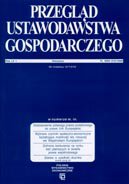In the article, the author emphasizes the most important issues arising from supervisory soft law, based on the example of EBA guidelines on the principles of product supervision and management. These guidelines are a very important element of the contemporary policy of protecting financial services customers in the EU, which is, above all, to be effective. Because of this, they are in some ways unique. Nevertheless, before the domestic court, they were challenged by the French Banking Association, as a result of which the CJEU will soon decide whether they are "genuine" soft law instruments and whether they were lawfully issued.
The aim of the article is to draw attention to the fact that the EU soft law acts covering the matter of financial supervision may be applied and interpreted differently not only by the addressees, but also by national courts (tribunals), public administration institutions or bodies forming part of national financial safety nets. Therefore, it is desirable that a uniform, contemporary view on this subject is formed at the EU level, which — in the author's opinion — is prompted by the extensive justification of the Advocate General's opinion presented on April 15, 2021 in case C-911/19. Especially since the very fact of challenging the EBA guidelines is a novelty in the financial market law.
Keywords: EBA guidelines; product oversight and government (POG); financial services consumer/client protection; supervisory soft law; CJEU

